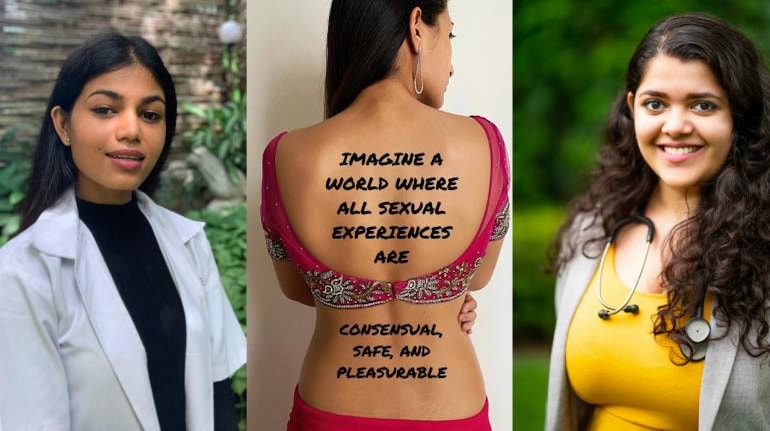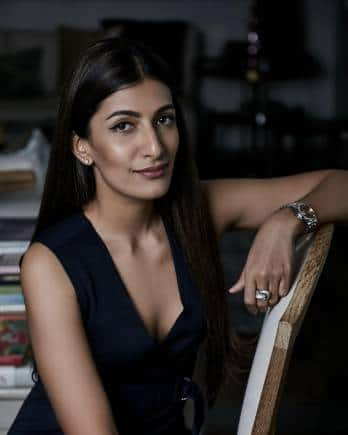
Note to readers: Being Indian is a limited series on what it means to be Indian today - personally and professionally.
As a scrawny teenager who would bawl at the very mention of the word ‘sex’, it’s heartening to witness an increasing number of sex-positive conversations today. Interestingly, I have learned more about my body and its right to pleasure in my 30s, thanks to the ever-growing brigade of pleasure-focused sex-ed content creators on social media.
From busting myths and misconceptions about the human body to disseminating information about sexually-transmitted infections, abortion, contraception, and more – these ‘influencers’ are helping the young and old alike shatter generations of taboo, one video at a time.
But what is it like to be on the other side? Does being a sex-ed content creator in a country like India come with its own set of challenges, or is it a fun, breezy ride?
Leading names in this space – Dr Tanaya Narendra (popularly known as Dr Cuterus), Leeza Mangaldas and Zoya Ali aka Uteropedia, tell us all.
Dr Tanaya Narendra (aka Dr Cuterus)
“The experience of being a content creator in the sex-ed space is hilarious, empowering and sometimes, frustrating. I am glad we get an opportunity to connect with so many people, helping them learn about their bodies and enabling them to love it a little bit more,” says Dr Cuterus, who is a trained medical doctor, embryologist and scientist.
However, she admits people sometimes violate her boundaries, which can be uncomfortable. “We don’t want to wake up to penis pictures or images of infections in our inbox. But we also get a curious insight into how the human brain works, which can be hilarious sometimes,” says Dr Cuterus.
While sex education is less taboo today, it is a space that is accessible to a restricted few. Dr Narendra attempted content-creation in Hindi to reach a larger audience but had a hard time of it, with incessant trolling and harassment.
Despite that, the pleasure-focused content creator who has over a million Instagram followers, and a best-selling book and podcast to her credit says she has seen some change as a result of constant pushing and ‘cutefying’ sexual health to make it more accessible.
Apart from her relentless pursuit to spread sexual health awareness in India, Dr Narendra is equally passionate about steering more people to get vaccinated against cervical cancer. India has the highest global burden of human papillomavirus (HPV)-related deaths in the world, since the illness is diagnosed much later due to the presence of vague symptoms. Through her ‘90-second reels’, she wants to motivate more people to take early action against the epidemic.
“We are currently petitioning the government to make HPV vaccination a national immunization protocol because the current vaccine is about Rs 10,000 per dose, which makes it inaccessible for most. I am trying to push for the protection of more people, so that they can battle this deadly disease,” concludes Dr Cuterus.
HPV vaccine prices vary - while Gardasil currently offers two types of vaccine in the market, priced between Rs 3,957 and Rs 11,000 per dose, the Serum Institute of India launched its Cervavac HPV vaccine at Rs 2,000 per dose this year.
Leeza Mangaldas
“Sex is still a taboo subject in India. Victorian social norms and laws established during the British rule remain central to public attitudes. Homosexuality was only decriminalized in 2018 and premarital sex remains frowned upon. Marriage still feels unavoidable, especially for women. In 2023, marital rape is still legal,” says Mangaldas.
Under these circumstances, most young people have no choice but to learn about sex on the internet. That’s where content creators like Mangaldas step in to provide scientifically accurate and judgement-free information to their audiences.
 Leeza Mangaldas
Leeza Mangaldas
With a following of two million subscribers across platforms like YouTube, Instagram, and Facebook, Mangaldas's pleasure-focused sex education content has been well-received ever since she started out five years ago. She is also a best-selling author, runs a chart-topping Hindi sex education podcast, and recently founded Leezu’s – a joyful personal care and intimacy brand.
“I do not mean to blow my own trumpet here. But why are millions of young people turning to a stranger on the internet like me for their sex-ed and sexual wellness tools?” asks Mangaldas. “Those who are tasked to provide it...either refuse to talk about it, or actively perpetuate a culture of shame and silence,” she adds.
A 2022 systematic review by the World Health Organization and The Pleasure Project provided qualitative and quantitative evidence that SRHR (sexual and reproductive health and rights) interventions incorporating pleasure are likely to have positive effects on a variety of behavioural and information outcomes. “Affirming human sexuality and the reasons why people have sex can be an important way to ensure sexual health interventions are effective,” she adds.
While there has been a boom of sexual wellness information, content, and products via social media over the last five years – one of the greatest challenges to creating sex-ed resources, Mangaldas says, is the censorship being increasingly built into platforms today. “There was a time when the internet seemed like a utopian place where you could express yourself freely. However, social and digital media have, and are continuing to become, increasingly restrictive over time like traditional media was,” she says.
Zoya Ali (aka Uteropedia)
Over the last few years of being a sexuality educator, Zoya Ali, popularly known as Uteropedia on Instagram, has witnessed a huge transformation in the niche. “In a landscape where discussions about sexual health are gradually emerging from the shadows, there's far more receptivity and appetite for this information now that fuels the desire to spread awareness. However, this newfound enthusiasm doesn't mean the road is without obstacles,” says Ali, a reproductive health scientist.
Each day feels like stepping on to a new battlefield, she says. Not only does Ali unravel the mysteries of the human body, she also has the responsibility of untangling the web of misinformation that has lingered for far too long.
It doesn’t end here.
“Unlike earlier, being a subject matter expert is not enough to keep the audience engaged and informed. You also have to keep up with social media trends to deal with reducing attention spans,” she admits.
Uteropedia is Ali’s way of being the person she never had while growing up. Like most others, there was no reliable channel she could access, to learn more about sex. This led her to lean on bits and pieces from pop culture, media and porn that perpetuated a cycle of misinformation.
“With my content, I try to touch upon a wide range of topics around sexual and reproductive health to bust myths and provide accurate information, tackling stigma and fostering healthy conversations,” she explains.
In a society where sex is considered taboo, digital resources provide individuals the opportunity to learn privately and at their own pace, averting the awkwardness associated with face-to-face conversations on such sensitive subjects.
“A cautious approach is still essential. Amidst this digital evolution, discerning the reliability of information sources is important,” she adds.
While challenges and taboos continue to exist, there is a prevailing trend towards open conversations around sexual health. However, it is equally important to integrate sex education as part of school curricula, as proposed by the Indian government.
“While some institutions have embraced these topics and integrated them into their curricula, others may be resistant due to cultural, religious, or societal factors. Moreover, despite the provision of teacher training guidelines, ingrained biases can influence educators' approach to these subjects,” says Ali.
Discover the latest Business News, Sensex, and Nifty updates. Obtain Personal Finance insights, tax queries, and expert opinions on Moneycontrol or download the Moneycontrol App to stay updated!